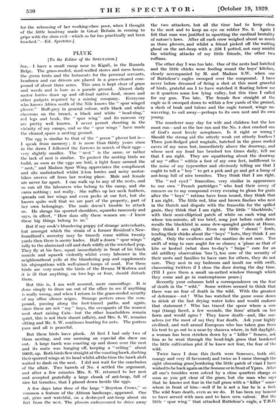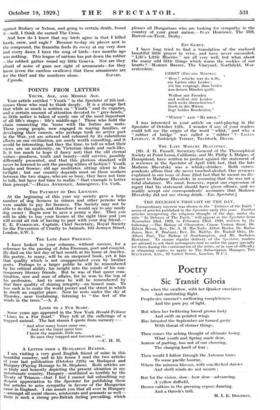PLUCK
[To the Editor of the SPECTATOR.] SIR,-I have a small camp near to Kigali, in the Ruanda Beige. The grass-roofed, mud-walled stores and mess house,
the green tents and the hutments for the personal servants, headmen and car drivers are placed in a grass-cleared com- pound of about three acres. This area is kept clear of grass and weeds and is bare as a parade ground. Almost daily
motor lorries draw up and off-load native food, stores and other gadgets required by a mining company. Everyone
who knows Africa south of the Nile knows the " spur winged plover." Buff-grey in general colour, with black and white chevrons on the breast, a black and white " head-ring," red legs and beak, the " spur wing" and its raucous cry are pretty well known. I never permit shooting in the vicinity of my camps, and so the " spur wings " have made the cleared.space a nesting ground.
The egg is similar to that of the " green " plover but is— I speak from memory ; it is more than thirty years since
in the dawn I followed the furrows in search of their eggs—
very slightly smaller. The " nest " is the same, or rather the lack of nest is similar. To protect the nesting birds we build, as soon as the eggs are laid, a light fence around the " nest," and Madam Spur Wing appreciates the compliment and sits undisturbed whilst 2-ton lorries and noisy motor- bikes swerve off from her resting place. Male and female are never far apart. I can walk up to any of the nests, and so can all the labourers who belong to the camp, and she cares nothing ; not really. She ruffles up her neck feathers, spreads out her wings and even pecks at our feet, but she knows quite well that we are part of the property, part of her own belongings. The male doesn't trouble to attack us. He shrugs his spurred shoulders, squawks raucously and says, in effect, " How dam silly these women are-1 know these big things belong to us."
But if my cook's blundering puppy (of strange antecedents, but amongst which the strain of a former Resident's New- foundland's ancestry may be traced) come within twenty yards then there is merry hades. Half a dozen " spur wings " rally to the alarm and call and dash wildly at the wretched pup. They fly at his face, squat immediately in front of his black muzzle and squawk violently whilst every labourer in the neighbourhood yells at the blundering pup and supplements his objurgations with well-aimed lumps of mud. For these birds are very much the birds of the Bwana M'Kubwa and it is ill that anything, on two legs or four, should disturb them.
But this is, I am well assured, mere camouflage. It is done simply to draw me out of the office to see if anything is really wrong, and when I return to the grass-roofed security of my office silence reigns. Strange porters cross the com- pound, passing along the foot-traced paths, and again, since these are not "my" boys, the occupants of the nearest nest start raising Cain—but the other leaseholders remain quiet, this is not their shauri (affair), and Mrs. S. W. remains sitting and Mr. S. W. continues hunting for ants. The porters pass and all is peaceful.
But these birds have pluck. At first I had only two of them nesting, and one morning an especial din drew me out. A large hawk was coasting up and down over the nest and its mate was hanging off, keeping a "ceiling" about 100 ft. up. Both birds flew straight at the coasting hawk, dashing their spurred wings at its head whilst all the time the hawk aloft waited to dash on the nest. I did not wait for the conclusion of the affair. Two barrels of No. 4 settled the argument, and after a few minutes Mrs. S. W. returned to her nest and accepted gratefully a large chunk of ant-heap, full of nice fat termites, that Iplaced down beside the eggs.
A few days later three of the large " Royston Crows," so common a feature of the African landscape, appeared. One sat, grim and watchful, on a destroyed ant-heap about six feet from the nest. The plovers endeavoured to drive away the two attackers, but all the time had to keep close to the nest and to keep an eye on robber No. 3. Again I felt that Man was justified in upsetting the cardinal brutality of nature's laws. After all each crow weighed about as much as three plovers, and whilst a friend picked off the waiting ghoul on the ant-heap with a .256 I potted, not easy amidst the whirling attacks of my little friends, the other two ruffians.
The other day I was too late. One of the nests had hatched and the little chicks were feeding round the boys' kitchen, closely accompanied by M. and Madam S.W. when one of Batteleur's eagles swooped over the compound. I have never before dreamed of firing a shot at this most graceful of birds, grateful am I to have watched it floating below me as it quarters some low lying valley, but this time I called for my gun. Too late. The female flew straight at the eagle as it swooped down to within a few yards of the grohnd, a slash of beak and talons and the eagle turned, wings un- wavering, to sail away—perhaps to its own nest and its own young.
The murderer may slay for wife and children but the law must run—and so the law ran and the No. 4 shot crashed one of God's most lovely aeroplanes. Is it right or wrong ? Should the strong aid the utterly weak yet utterly fearless ? Three just-fledged pied wagtails, hatched in the grass roofed eaves of my mess hut, immediately above the doorway, and whose nest my head has brushed ten times daily, tell me that I am right. They are squattering about the doorway of my " office " within a foot of my own feet, indifferent to the noise of my typewriter and obviously telling me that I ought to tell a " boy " to get a pick and go and get a lump of ant-heap full of nice termites. They think that I am right.
The " red eyed " francolins, very similar in appearance to our own " French partridges " who lead their covey of runners on to my compound every evening to glean for grain after the " boys' "- rations have been issued, they think that I am right. The little red, blue and brown finches who nest in the thatch and dispute with the francolin for the spilled grain, they think that I am right. The little " blackbirds," with their semi-elliptical patch of white on each wing and whose ten-minute, all too brief, song just before each dawn recalls the blackbird in some dew-spangled garden at Home, they think I am right. Even my little " shenzi " fowls, tending their chicks about the " boys' " huts, they think I am right. Only the swallows and the martins do not care. Too swift of wing to care aught for so clumsy a 'plane as that of kite or kestrel (what does to-day's " Snipe " care for an old artillery observation 'bus ?), too sure of the security of their nests and families to have care for others, they do not care. They nest in my bedroom and insult me with swift, clamouring twitters if I close the door during the day time. (Till I gave them a small un-netted window through which they come and go in contemptuous peace.) Recently your columns held a correspondence on the fear of death in the " wild." Some writers seemed to think that there was no fear of death in the wild. With the greatest of deference—rot ! Who has watched the game come down to drink at the fast drying water holes and would endorse that statement ? Who has traced the spoor where a cow topi (tiang) faced, a few seconds, the lions' attack on her fawn and would agree ? They know death—and, like our- selves (or the most of us) they fear death. Ask your highly civilized, and well armed European who has taken gun from his tent to go out to a near-by shamva where, in full daylight, a woman has been stricken down by a " killer " lioness, ask him as he went through the head-high grass that bordered the little cultivation plot if he knew not fear, the fear of the wild.
Twice have I done this (both were lionesses, both old, mangy and very ill favoured) and twice as I came through the sight obscuring grassbordering the little patch of viasi I have wished to be back again on the Somme or in front of Ypres. After all one's troubles were solved by a close quarters charge as soon as you g,ot clear of the grass, but the man who says that he knows not fear in the tall grass with a " killer " some- where in front of him—well if he is not a liar he is a fool. The wild fears death, even as we do. It has been my honour to have served With men and to have seen valour. But the little 'spur wing that attacked Batteleur's eagle, a T.B.D.
against Rodney or Nelson, and going to certain death, found it—well, I think she earned The Cross.
And how do I know that my birds agree in that I killed hawk, crow, and eagle ? Because to-day six plover nest in the compound, the francolin feeds its covey at my very door and every dawn I have the song of birds—two months ago was nothing. This league of nations has put down the robber —the robbed gather round my little Geneva. Nor are they afraid of noise of guns nor sight of armaments—for they know (even the careless swallows) that these armaments are























































 Previous page
Previous page